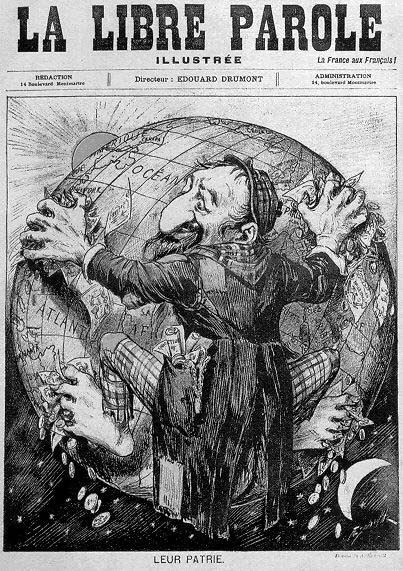Is Antisemitism Dead? A Philosophical Consideration

Around six months ago, the influential Oxford Handbooks series published a print and online entry on “The Radical Right and Antisemitism.” The author of the entry is Ruth Wodak, a Jewish academic in Critical Discourse Studies at England’s Lancaster University. I have to confess to having never before heard of this discipline. Unsurprisingly, however, it appears to be a variant of Frankfurt School thought, and, in several respects, continues that philosophical outlook’s obsession with anti-Semitism. Some of Wodak’s most recent publications concern “hate tweets,” and she is especially vexed by popular discourse about “elites” or “traitors,” because she believes, probably with some merit, these are veiled discussions of Jews. Biographical details aside, the reason I found Wodak’s entry for Oxford Handbooks to be interesting and worth sharing here is that it effectively acts as an obituary for antisemitism. Although I don’t agree with much of what Wodak argues, some of the points raised are food for thought, and the products of my own thoughts on the current state of anti-Jewish thought (and its implications for our movement) are presented here.
Wodak opens by considering “the question of whether antisemitism today should be regarded as a genuine structural feature of contemporary society or rather as a relic of an old but now overcome European ideology.” She continues by outlining the scholarly consensus:
Many scholars in the area of right-wing populism believe that antisemitism has practically vanished from the political arena and become a “dead prejudice” (Langenbacher and Schellenberg 2011; Beer 2011; Betz 2013; Botsch et al. 2010; Albrecht 2015; Rensmann 2013; Stögner 2012, 2014) or that anti-Muslim beliefs and Islamophobia have more or less completely replaced it (Bunzl 2007; Fine 2009, 2012; Kotzin 2013; Wodak 2015a, 2016). … The British sociologist Robert Fine critically observes, “Antisemitism is tucked away safely in Europe’s past, overcome by the defeat of fascism and the development of the European Union. . . . Antisemitism is remembered, but only as a residual trauma or a museum piece” (Fine 2009, 463).
Some of these scholars I am unfamiliar with, but Lars Rensmann’s work is well known to me. Rensmann is a particularly sad case. Still under 50 years of age, he’s a classic case of a guilt-ridden German preoccupied with the Jewish experience during World War II. As early as Rensmann’s teenage years, he was obsessively reading the works of the Frankfurt School. When he was 22, he travelled to the United States to meet the last living member of the original Frankfurt gang — the then 91 year old Leo Löwenthal. In his most recent work, a celebration of the Frankfurt School’s work on antisemitism [The Politics of Unreason: The Frankfurt School and the Origins of Antisemitism (2017), Free PDF here], Rensmann recalls the meeting (p. viii) in such a fashion as to evoke the impression he was fully in thrall to the “Jewish guru” phenomenon:
Responding to a letter I had written to him, Leo was so incredibly generous to invite me, the twenty-two-year- old student, to come to visit him, the ninety-one-year- old professor, in Berkeley—where he taught sociology at the University of California since 1956—and to stay at his home. So I did, and we spent days talking about Critical Theory—an experience I will never forget. In my conversations with Leo, for the first time I fully grasped the Frankfurt School’s rich historical and philosophical trajectories and Critical Theory’s potential as a living tradition that can be relevant in the contemporary world. Leo Löwenthal passed away just half a year later, before I could visit him again. But much of my academic work is inspired by him, from my first theoretical musings to my later work on the Frankfurt School, political sociology, the radical right, and authoritarian politics of resentment; and so is this book in particular—in which Leo’s academic research and theorizing play a major role. In this study, Löwenthal’s contribution to the Frankfurt School’s thinking about the “antisemitic question” is attributed the central place in the scholarly canon it thoroughly deserves. For him, as he told me then, the problem of antisemitism remained a pressing concern of our time. The book is, like my first one almost two decades ago, dedicated to the memory of Löwenthal, one of the great intellectuals of the twentieth century.
Rensmann’s 600-page The Politics of Unreason, like Wodak’s entry for Oxford Handbooks, is a kind of intellectual poking through the embers, where, in between a panegyric to his Jewish intellectual fathers, Rensmann declares antisemtism (p.398) “a phenomenon of the past.” Antisemitism is treated, much as Fine suggested it be treated, as a museum piece — a force that was more or less demolished by Löwenthal et al., and has left nothing but occasionally problematic fragments.
The Death of Antisemitism?
The question of antisemitism’s death is necessarily comparative. It implies that aspects of modern antisemitism that were once “alive” are no longer so. These aspects are easily identified. “Political antisemitism,” which probably began in the 1870s, more or less ceased to exist in 1945 in the sense that explicitly anti-Jewish elements vanished from lobby groups, political parties, and public policy throughout the West. Key facets of political antisemitism such as the management and exclusion of Jews in areas of public life (for example, via voting restrictions and educational quotas) are no longer in place in any Western country, and it is currently unthinkable for anyone to even suggest such policies. Another once-lively aspect of modern antisemitism that is now dead is “anti-Semitic discourse.” The historical presence of anti-Jewish thought in Western literature and its broader culture are today distorted and exaggerated by Jewish academics and those eager for grants.
It is undeniable, however, that a mainly negative discourse about Jews was extant in all areas of Western art and culture prior to the 1950s, and this discourse was a powerful force in energizing and disseminating knowledge about Jews. Linked with cultural discourse was popular journalism. Anti-Jewish newspapers, with mainstream or near-mainstream circulation, were once relatively common in the West. Some editors, such as the Frenchman Édouard Drumont, even rose to public (and electoral) prominence. Again, it is quite unthinkable for something of this nature to happen today.
Perhaps more important than the vanishing of any of these aspects, is the relative disappearance of knowledge of Jews among the Western masses. Indeed, there has been the almost total transformation in what the mass of the public “knows” about Jews. The transformation has been a dramatic shift from objective to subjective knowledge. For example, ask a random member of the public today what they know about Jews, and they would very likely respond by regurgitating a series of banal, media-derived tropes: Jews are good actors/directors/comedians; Jews are harmless and very smart/talented; Jews are a historically downtrodden and victimised group. This is essentially “junk” knowledge; entirely subjective, and more or less useless to forming a meaningful opinion on matters involving Jews — or worse, this “knowledge” is actually obstructive to forming a meaningful opinion on matters involving Jews. The contemporary situation contrasts sharply with the knowledge earlier generations possessed about Jews (derived from politics, journalism, and anti-Semitic discourse), and with the knowledge possessed by those today classed as anti-Semites. This knowledge includes objective facts: population statistics of Jews and their relative wealth; the prevalence of actual positions of influence occupied by Jews, particularly in the media and in the political process (e.g., the Israel Lobby, donors to political candidates); the contents of Jewish intellectual efforts (from the Talmud to the Frankfurt School and beyond); the prevalence of Jews in White Collar crime; the reality of the Jewish relationship with moneylending/usury; the extent and nature of Jewish involvement in the pornography industry; and the manner in which Jews view non-Jews.
An intellectual gulf lies between these two forms and levels of knowledge, and the latter is overwhelmingly stifled by the former. Equally important is the fact that, even when the masses are “educated” on ostensibly objective themes, their educators are likely to be Jewish academics, Jewish authors, or Jewish presenters of Jewish-produced television documentaries. Any account or interpretation of the history of Jewish-European interactions rooted in the perspective or interests of their ancestors is almost non-existent. Thus, in the absence of meaningful contemporary knowledge, Jews have an effective monopoly on historical or historiographical perceptions of their group — something unprecedented for any minority group in world history.
This brings us to the reasons for the “death of antisemitism,” or at least those aspects outlined above. Lars Rensmann is probably correct when he writes (p.2) that the Frankfurt School
has had a significant and lasting impact on the social sciences and humanities. It has influenced and partly shaped various fields and subfields, from modern philosophy, social and political research, social psychology, cultural studies, to critical legal studies, international relations, and global political theory.
Rensmann is correct, not in the sense that the Frankfurt School was successful in “debunking” antisemitism as a symptom of an authoritarian syndrome, or as a structural problem of modernity, but in the sense that this clique of Jewish intellectuals was very successful in creating a set of ideas that penetrated all areas of socio-political life, and especially those channels via which a culture converses with itself about itself. These ideas helped to break down Western nations, or at least make them more malleable to Jewish interests. A key part of this effort was the pathologization of ethnic interests among Whites, a move that certainly made increasing censorship of the expression of such interests more palatable and acceptable to the mainstream. In tandem with “Holocaust education,” which was strongly advocated by the Frankfurt School as a kind of prophylactic against what they termed “secondary antisemitism,” the portrayal of anti-Jewish attitudes as quasi-criminal and somehow associated with mental illness undoubtedly had a devastating effect on political, cultural, and journalistic modes of anti-Jewish expression.
Jews have also developed increased capacities for censorship. Censorship has taken both overt and covert forms. Covert forms included gaining decisive influence over key industries, or branches of industries, and setting their agenda. Hollywood and major news outlets are excellent examples of soft, covert censorship, where the public is delivered copious amounts of information with key omissions. The softer side of overt censorship comes in the form of organized boycotts, the deprivation of advertising, and the lobbying of opposition. Hard overt censorship includes the firing and de-platforming of dissenters on social media and, at the extreme end, the criminalization of dissent via “Holocaust denial” and “hate speech” legislation.
Crucially, after effectively killing the “Jewish Question” as a discourse within Western culture, the same intellectuals planted new and, for Whites, self-recriminating ideas in its place. The process was very simple. The starting point of Frankfurt School thought was to deny the existence of a “Jewish Question,” and to posit instead the “antisemitic question.” This was a deft rhetorical manoeuvre that acknowledged the reality of a malfunction in the relationship between Jews and host populations but shifted the role of antagonist away from the Jews. In this scheme of thought, Jews were repeatedly targeted because of neuroses in the societies around them. Identifying Western civilisation as especially pathological, the “antisemitic question” slowly morphed into the “Western civilisation problem.” From there, it was a short distance to assuming there was something wrong about how Westerners (Whites) viewed themselves in relation to the world. Critical theory thus arrived at the “Whiteness problem.” Ironically, or perhaps cynically, for all their dismissals of antisemitism as a crude and pathological “world explanation” for one’s individual problems, the Frankfurt School (particularly in Dialectic of Enlightenment and their works on the “authoritarian personality/syndrome”) laid the groundwork for a new Question — the “Whiteness Question.” Indeed, Whiteness, more or less interchangeable for Western culture in the eyes of Jewish intellectuals and their academic co-conspirators, can today be held responsible for an array of putative social ills (e.g. sexism, racism, colonialism, toxic masculinity, poor health, crime, the excesses of capitalism, social alienation, poverty, war) that far exceeds any charges laid at the feet of the Jews by people now deemed “paranoids,” “failures,” and “obsessives.”
What Remains?
As a consequence of the developments described above, antisemitism is undeniably a marginal element of thought and activism on what is regarded as the Right. There simply isn’t enough room here to go into a discussion of how genuinely “Right” the contemporary “Right” is, but it can probably be agreed that contemporary political conservatism (exemplified by the GOP in the U.S. and by the Conservative party in the U.K.) and most so-called “populist” groups or parties (AfD, UKIP, Dutch Party for Freedom, etc.) are to the right of those groups self-identifying with the political Left. It’s a fact that antisemitism has almost totally vanished from the platforms of every one of these groups, and in many cases these groups profess gushing admiration of both Jews and Israel based on the kinds of “subjective knowledge tropes” discussed above. For many of these organizations, Jews are viewed as a model minority, especially when compared with Muslim immigrants.
Wodak cites the work of Damir Skenderovic who argues in The Radical Right in Switzerland: Continuity and Change, 1945–2000 (2009):
after the Second World War, overt statements of modern antisemitism, making use of blunt categorisations, have largely vanished from the public sphere and have become confined to marginal extreme right groups..
Wodak continues: “Skenderovic … implies that a coherent antisemitic ideology has vanished.” It has been argued by most scholars, including Wodak and Rensmann, as well as organizations like the ADL, that a kind of fossil antisemitism [Skenderovic terms it “post-Holocaust” or “post-fascist” antisemitism] has now taken the place of a coherent antisemitic ideology and associated trappings, and they argue the case for a subliminal, tertiary, highly coded form of antisemitism that relies on faint echoes of the old discourse. Thus, in this New Books in Critical Theory podcast Lars Rensmann accuses Donald Trump of employing coded anti-Semitism in his closing campaign ad, in which George Soros, Federal Reserve head Janet Yellen, and Goldman Sachs CEO Lloyd Blankfein, all of whom are Jewish, appear onscreen as Trump discusses his ambitions to challenge “levers of power in Washington” and “global special interests.” Similarly, Wodak spends a great deal of time analyzing the contents of statements from Jobbik politicians in Hungary, including this one:
If, after the fifty years of your communism, there had remained in us even a speck of the ancient Hungarian prowess, then after the so-called change of regime your kind would not have unpacked your legendary suitcases, which were supposedly on standby. No. You would have left promptly with your suitcases! You would have voluntarily moved out of your stolen . . . villas, and . . . you would not have been able to put your grubby hands on the Hungarian people’s property, our factories, our industrial plants, our hospitals. . . . We shall take back our homeland from those who have taken it hostage! (“A Magukfajták ideje lejárt: Morvai Krisztina reagál az Élet és Irodalom cikkére in Barikad,” Alfahír, November 12, 2008)
It could be reasonably argued that these are indeed subliminal messages that appeal, intentionally or otherwise, to half-forgotten discourses.
Two qualifications are, however, required. The first is that Jews unquestionably occupy elite positions within the social-political-cultural status quo and use these positions mainly to advocate for leftist social policies including mass immigration. Conservative, anti-establishment, and anti-immigration parties will necessarily and eventually come into conflict with Jews simply by identifying some of their opponents. In other words, a political party can (in theory) portray Jewish individuals, or a number of Jewish individuals, as opponents in propaganda without possessing a sophisticated level of objective knowledge about Jews, or a systematic and coherent antisemitic ideology. A good example is George Soros, the target of a very public campaign by the Hungarian government to abolish the influence of foreign-funded NGOs. The second qualification is that, even if antisemitic messages were in fact intentionally and subliminally present, they are almost certainly too subtle and can no longer resonate usefully with a corresponding broader discourse in society. In this sense, even if these are “dog whistles,” it’s the social/propaganda equivalent of using a dog whistle in an area 99.9% occupied by cats. The message simply isn’t going to be received.
Not Dead Yet.
Kevin MacDonald has noted, “the remarkable thing about anti-Semitism is that there is an overwhelming similarity in the complaints made about Jews in different places and over very long periods of historical time.”[1] At the core of these complaints are conflicts of interests between Jews and surrounding populations. That being said, attitudes and discourses concerning Jews have occasionally shed outer ideological skins and adopted more novel and sophisticated forms. These changes occurred mainly due to, first, the decline of religion, and second, the rise of science. The biggest change in outward forms of anti-Jewish attitudes, occurring between the 18th and 19th centuries, thus concerned the shift away from religious explanations of Jewish behavior, and towards racial/biological/ethnic/cultural explanations. The changes necessarily entailed the development of new forms of knowledge about Jews, and new discourses.
This is important, because I believe we are in a position where the onus is on us to develop and further a discourse in which our objective knowledge concerning Jews is once again brought to bear on the mainstream and thus create an atmosphere in which “dog whistles,” when they genuinely occur, resonate more deeply and successfully. It is a call to “revival.” There is no doubt that our demographic and political context has changed sufficiently for us to abandon older forms. By this I refer to the relative contemporary (un)usefulness of attempting to teach members of the general public about the Rothschilds, Jewish diamond monopolies in the nineteenth century, or even the origins of Bolshevism. These are areas of history that are vitally important to research and build a body of work on (even if only for ourselves — and I myself have contributed to this form of knowledge), but I have my doubts about their effectiveness of creating a vital and growing contemporary discourse about Jews.
Whether we are conscious of it or not, our attitudes towards Jews are already significantly different from those termed “anti-Semites” in the past; these changes in attitude are probably occurring “naturally.” To begin with, our attitudes are infused with new concerns and elements. Jewish activism in breaking down immigration control, promoting mass immigration, building and implementing so-called hate speech legislation, and the White guilt industry are just some of the major concerns we are now confronted with that simply weren’t present in earlier eras. Economic matters, a mainstay of anti-Jewish critique for centuries, are now more or less subsumed within other areas of focus simply because of the great diffusion of economic responsibility in the postmodern era. My series of essays on contemporary Jewish moneylending was, in many respects, a detective work in which I was forced to follow the chain of endless companies operating under endless names in order to find who actually owned and operated the world’s exploitative payday loan businesses. This is a radical change from being able to point to a Rothschild or an Oppenheimer, or from a local Jewish credit merchant in rural Russia or 1910s’ Chicago.
Rather than being “dead,” I believe antisemitism is seeing these new elements cohere into a new discourse orbiting an Identitarian form of anti-Jewish critique that is based on a sophisticated level of objective knowledge about Jews, underpinned by a coherent anti-Jewish ideology. I believe we already have what we need in terms of foundational texts, most obviously in Kevin MacDonald’s Culture of Critique series, as well as some of my own essays, and those of other great contributors at this crucially important website, like Brenton Sanderson and Edmund Connelly. One of the great weaknesses of “scholarship” produced by those like Wodak and Rensmann is that they have failed to see this development and take into account how influential it has been on the formation of new political movements like the Alt-Right and, via meme culture, among the young. The task remains, of course, to further the discourse in the face of overwhelming Jewish censorship. This is no easy task, but we might benefit from seeing “the obstacle as they way” — by further drawing out our opponents and then incorporating Jewish censorship itself into the discourse.
Regardless of form, I get the distinct impression we should turn the volume up and let them know that rumors of our demise are greatly exaggerated.
[1] K. MacDonald, Separation and Its Discontents: Toward and Evolutionary Theory of Anti-Semitism, (First Paperpack Edition, 2004), 38.












